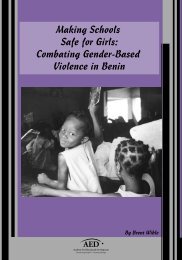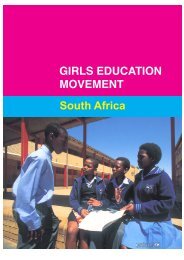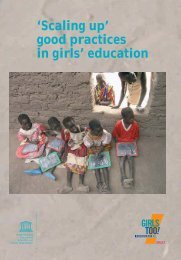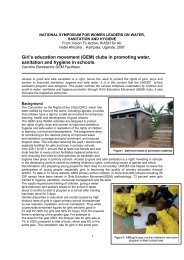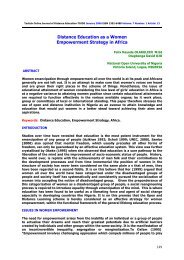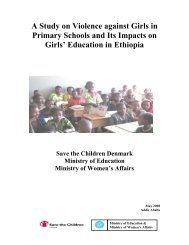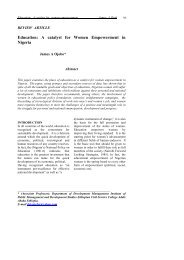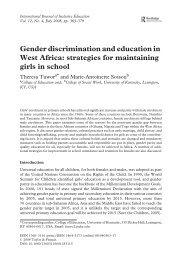Promoting basic education for women and girls ... - library.unesco-ii...
Promoting basic education for women and girls ... - library.unesco-ii...
Promoting basic education for women and girls ... - library.unesco-ii...
You also want an ePaper? Increase the reach of your titles
YUMPU automatically turns print PDFs into web optimized ePapers that Google loves.
urkina Faso<br />
56<br />
parent–teacher associations to ensure that 40–60 per<br />
of pupils are <strong>girls</strong>. In addition, these schools are scent Catholic Relief Services: Its Education Support<br />
(Programme de Soutien à l’Éducation - ESP)<br />
pro-<br />
with separate toilet facilities <strong>for</strong> boys <strong>and</strong> <strong>girls</strong>.<br />
s<strong>for</strong> at raising the rate of school enrolment, encourage<br />
attendance (particularly by <strong>girls</strong>), reducing drop-<br />
asvided<br />
aProgramme aaims rate, raising the level of success in primary <strong>education</strong>,<br />
sensitive parents to their role in ensuring the educa-<br />
of their children).<br />
Faschool Fout<br />
F<strong>and</strong> Ftion In 2001, the organization intervened in the following<br />
aareas:<br />
School feeding. To encourage school attendance<br />
<strong>and</strong> to improve per<strong>for</strong>mance of both boys <strong>and</strong><br />
<strong>girls</strong>. Working in collaboration with the Ministry<br />
of Basic Education <strong>and</strong> Literacy (MEBA), the organization<br />
distributed 16,000 tonnes of foodstuff to<br />
400,000 children in 2,344 primary schools.<br />
School health <strong>and</strong> nutrition. The distribution<br />
of micro-nutrients, <strong>basic</strong> medicines to primary<br />
school children, <strong>and</strong> the promotion of heath/<br />
nutrition <strong>education</strong>, <strong>and</strong> the supply of medicine<br />
kits to schools.<br />
School infrastructure. Mobilizing local communities<br />
through a ‘food <strong>for</strong> work’ arrangement. Twenty<br />
primary schools were thus constructed in 2001.<br />
‘Take Away’ Ration. At the end of every month,<br />
Girls who attain 90 per cent school attendance<br />
are given 10 kg of wheat flour, intended to help<br />
the family in periods of food scarcity <strong>and</strong> to<br />
raise self-confidence in <strong>girls</strong> as being useful to<br />
the family. 4,000 <strong>girls</strong>, drawn from 135 schools,<br />
benefited from this bonus in 2001.



